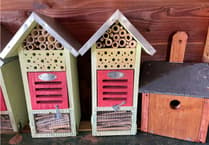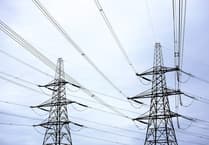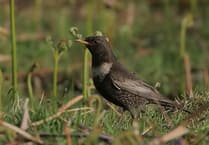Wildlife organisations on both sides of the border say they will up campaigning to halt pollution of the River Wye in both England and Wales.
Jamie Audsley, who took over as Herefordshire Wildlife Trust’s chief executive in August, told a meeting this week that with local elections due in the county next May “people don’t know about this issue, and elections are an opportunity to get this out there.”
“We will collaborate nationally on this, and also on consumer campaigns,” he said.
His counterpart on the Welsh side of the border, Radnorshire Wildlife Trust chief executive James Hitchcock, said: “Local politics matters, and Herefordshire is ahead of Powys on this – though we’ve just had a big change in leadership.”
But it would be “dangerous to pitch England against Wales” over the issue, he said.
“Wales has different agri-economics. The Wye gets markedly worse as it goes through England, where there are nutrient-hungry crops like maize from which phosphate runs off.
“Farmers are up against it and what they are doing is legal. The poultry industry could solve it overnight, but won’t without legislation and public pressure.”
The Environment Agency says more than 60 per cent of the phosphate in the Wye catchment, which causes harmful “blooms” of algae, comes from poultry and other livestock manure.
A crowd of about 65 had filled the upstairs of De Koffie Pot next to the Wye in Hereford to debate how to move forward on the issue, following a screening of the recent BBC TV documentary What’s Killing Our Rivers?, presented by environment correspondent Wyre Davies.
BBC Herefordshire reporter Nicola Goodwin, who worked on the programme, said it focused on the economic impact of the problem, “as those who don’t care about the river, will care about housing”.
Housebuilding in much of Herefordshire, as well as in parts of Wales, has been suspended unless developers can prove they wouldn’t be adding to the river pollution problem.
Mr Hitchcock added: “In Powys, the housing on hold is social housing.”
During the debate, Ms Goodwin’s father, local farmer Tracey Goodwin, said: “Every problem has a solution if you’re prepared to pay for it. But you can’t be in a more difficult time than now.”
He added: “Herefordshire land has seven years’ worth of phosphate in it, even if you don’t put on another gram. But it is needed further afield.”
Merry Albright, a local developer and campaigner, said: “Meat is only cheap because no one pays for the pollution is causes.”
Another local campaigner, Emil Morfett, said: “’De-stocking’ of farms is already being paid for by governments in the Netherlands and Ireland.”
Mr Audsley said of the proposed anaerobic digester at a Herefordshire farm intended to take poultry litter as feedstock, “we don’t think it’s the right answer”, while Mr Hitchcock said: “You still have to dispose of the digestate, and if the monitoring is poor, it won’t drive the change we need.”
The BBC documentary can be watched on TV and online via iPlayer.




